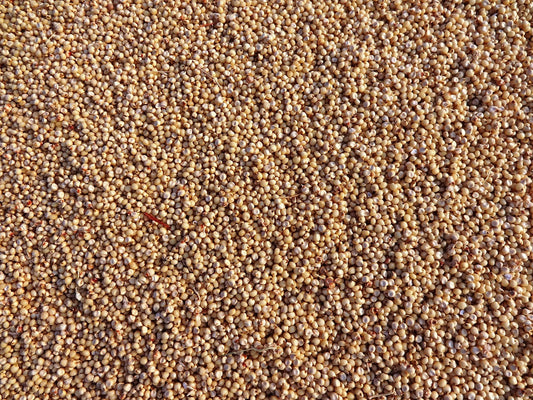What we eat has an impact on our health. In addition to assisting us in maintaining a healthy weight, a good diet can also lower our risk of developing chronic illnesses like diabetes, heart disease, and cancer.
A healthy diet, though, what exactly is it? Simply put, it's a diet that consists of a variety of foods that are high in nutrients and give our bodies the energy and nutrition they require to perform optimally. And a nutritious diet has advantages that go beyond good physical health. Our entire welfare and mental health can both benefit from a balanced diet.
In this article, we'll delve into the many ways in which a healthy diet can support our health and happiness & provide some practical tips and examples for making healthier food choices. Whether you're looking to shed a few pounds, boost your energy levels, or simply feel your best, a healthy diet can be a powerful tool for achieving your health goals.
Weight management
 One of the most well known benefits of a healthy diet is its ability to support weight management.
One of the most well known benefits of a healthy diet is its ability to support weight management.
If you're trying to lose weight, choosing nutrient-rich foods over empty calories can help you feel fuller & more satisfied while still cutting calories. And if you're trying to maintain a healthy weight, a diet rich in fruits, vegetables, whole grains, and lean proteins can help keep you on track. But weight loss and weight maintenance aren't the only reasons to focus on healthy eating. A diet that is rich in whole, unprocessed foods can also provide a variety of other benefits that go beyond the scale.
Some simple strategies for managing weight when it comes to diet are to:
- Focus on nutrient-dense foods: Rather than cutting calories by eliminating entire food groups or eating low-calorie, processed diet foods, try to incorporate more nutrient-dense foods into your diet. These include fruits, vegetables, whole grains, legumes, nuts & seeds, which are all high in fiber, protein, and other essential nutrients. These foods can help you feel fuller and more satisfied while still cutting calories.
- Eat mindfully: Pay attention to your eating habits and try to be more mindful of what and how much you eat. This can help you avoid overeating and make healthier food choices. Consider using smaller plates, eating slowly, and avoiding distractions while eating to help you better tune in to your hunger and fullness cues.
- Incorporate physical activity: Regular physical activity can help boost weight loss & maintenance efforts. Aim for at least 150 minutes of moderate intensity activity or 75 minutes of vigorous activity per week or a combination of both.
- Get enough sleep: Lack of sleep can disrupt hormone balance and increase appetite, making it harder to lose weight. Aim for 7-9 hours of sleep per night to support weight loss efforts.
- Seek support: It can be helpful to enlist the support of friends, family, or a healthcare professional as you work towards your weight loss goals. A support system can provide motivation, encouragement & accountability.
Let's take a look at some of the other ways in which a healthy diet can support our overall health & well-being.
Chronic disease prevention
 Eating a healthy diet is not just about maintaining a healthy weight or looking good on the outside - it can also have a major impact on your long-term health and well-being. A healthy diet can help to reduce the risk of chronic diseases such as diabetes, heart disease & cancer. These conditions are often the result of unhealthy eating habits and can have serious consequences for your overall health and quality of life.
Eating a healthy diet is not just about maintaining a healthy weight or looking good on the outside - it can also have a major impact on your long-term health and well-being. A healthy diet can help to reduce the risk of chronic diseases such as diabetes, heart disease & cancer. These conditions are often the result of unhealthy eating habits and can have serious consequences for your overall health and quality of life.
But how does a healthy diet specifically help to prevent chronic diseases? By providing the body with the nutrients it needs to function optimally & by limiting the intake of unhealthy foods. For example, a diet rich in fruits and vegetables is a great way to get a variety of antioxidants and other nutrients that can help to protect against chronic diseases. These foods are also low in calories & high in fibre, which can help to control weight and reduce the risk of obesity.
Whole grains, such as oats, quinoa, and brown rice, are also great for reducing the risk of chronic diseases. They are rich in fibre & other nutrients that can help to lower cholesterol levels and reduce the risk of heart disease. Lean proteins like poultry, fish, and beans are also good for reducing the risk of heart disease because they are lower in saturated fat.
Incorporating healthy fats such as those found in nuts, avocados & olive oil into your diet can also help to reduce the risk of chronic diseases. These fats are known for their heart-healthy properties and can help to lower cholesterol levels & reduce the risk of heart disease.
A healthy diet is an important aspect of chronic disease prevention - by making smart food choices and limiting the intake of unhealthy foods, you can help to reduce your risk of these serious conditions and live a longer, healthier life.
Improved mental health
 When it comes to our overall well-being our mental health is just as important as our physical health. A healthy diet can play a significant role in supporting our mental health and well-being. In fact, some studies have shown that a diet rich in nutrient-dense foods, such as fruits, vegetables & whole grains may help to improve mood and brain function.
When it comes to our overall well-being our mental health is just as important as our physical health. A healthy diet can play a significant role in supporting our mental health and well-being. In fact, some studies have shown that a diet rich in nutrient-dense foods, such as fruits, vegetables & whole grains may help to improve mood and brain function.
So how exactly does a healthy diet support mental health? For starters, fruits and vegetables are packed with antioxidants & other nutrients that can help to improve brain function and boost mood. These foods are also low in calories and high in fiber, which can help to regulate blood sugar levels and prevent fluctuations in energy and mood.
Whole grains, like oats, quinoa, and brown rice are also great for supporting mental health. They are rich in fiber and other nutrients that can help to improve brain function and boost mood. Lean proteins, like poultry, fish, & beans are also good for improving brain function and boosting mood because they provide the body with the nutrients it needs to function optimally.
Incorporating healthy fats, like those found in nuts, avocados & olive oil into your diet can also help to improve mental health. These fats are known for their brain-healthy properties and can help to improve brain function and boost mood.
A healthy diet is an important aspect of supporting mental health and well-being. By making smart food choices and incorporating nutrient-rich foods into your diet you can help to improve your mood and brain function and live a happier, healthier life.
Enhanced physical performance
 When it comes to physical performance proper nutrition is crucial. A healthy diet can help to fuel the body with the energy it needs to perform at its best while also helping to repair and rebuild muscles after intense physical activity. If you're an athlete or simply enjoy regular exercise, incorporating the following healthy foods into your diet could help to enhance your physical performance:
When it comes to physical performance proper nutrition is crucial. A healthy diet can help to fuel the body with the energy it needs to perform at its best while also helping to repair and rebuild muscles after intense physical activity. If you're an athlete or simply enjoy regular exercise, incorporating the following healthy foods into your diet could help to enhance your physical performance:
- Carbohydrates: Complex carbohydrates such as whole grains, fruits & vegetables are an important source of energy for the body. They can help to fuel the body with the energy it needs to perform at its best during physical activity.
- Protein: Foods like poultry, fish, and beans are good sources of protein, which is important for repairing and rebuilding muscles after physical activity. Consuming enough protein can help to support muscle growth and recovery.
- Healthy fats: Foods like nuts, avocados & olive oil are good sources of healthy fats, which can help to provide the body with sustained energy and support healthy brain function.
It's also important to stay hydrated when engaging in physical activity. Make sure to drink plenty of water before, during & after exercise to help keep your body hydrated and performing at its best.
In conclusion, a healthy diet is essential for enhancing physical performance and recovery. By incorporating the right mix of nutrients into your diet, you can help to fuel your body with the energy it needs to perform at its best and support muscle recovery after physical activity.
•••
The benefits of a healthy diet are numerous & cannot be overstated. A healthy diet can help with weight management, reduce the risk of chronic diseases such as diabetes, heart disease, and cancer, support mental health and well-being, and enhance physical performance and recovery.
To incorporate healthy foods into your diet, try the following tips:
- Make fruits and vegetables a key part of your meals and snacks. Aim for at least 5 servings per day.
- Choose whole grains, such as oats, quinoa, and brown rice, over refined grains.
- Opt for lean proteins, like poultry, fish, and beans, and incorporate healthy fats, like those found in nuts, avocados, and olive oil, into your diet.
- Limit your intake of added sugars, salt, and unhealthy fats.
- Drink plenty of water throughout the day to stay hydrated.
By following these tips and making smart food choices, you can enjoy all the benefits of a healthy diet and live a longer, healthier life.




